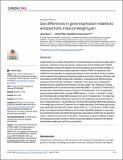Por favor, use este identificador para citar o enlazar a este item:
http://hdl.handle.net/10261/204588COMPARTIR / EXPORTAR:
 SHARE SHARE
 CORE
BASE CORE
BASE
|
|
| Visualizar otros formatos: MARC | Dublin Core | RDF | ORE | MODS | METS | DIDL | DATACITE | |

| Título: | Sex differences in gene expression related to antipsychotic induced weight gain |
Autor: | Sainz, Jesús CSIC; Prieto, Carlos CSIC ORCID ; Crespo-Facorro, Benedicto CSIC ORCID CVN | Fecha de publicación: | 15-abr-2019 | Editor: | Public Library of Science | Citación: | PLoS ONE 14(4): e0215477 (2019) | Resumen: | Antipsychotics are crucial for the treatment of schizophrenia and contribute to weight gain in psychosis, particularly during early phases. Antipsychotic Induced Weight Gain (AIWG) might contribute to reduce the quality of life, drug compliance and to increase mortality. To characterize sex differences of gene expression related to AIWG, we sequenced total mRNA from blood samples of schizophrenia patients, before and after 3 months of antipsychotic-treatment. We analyzed schizophrenia patients according to their sex (38 males and 39 females) and their BMI increase after medication, characterizing the differential gene expression before and after medication. Individuals in each group were categorized in patients who gain weight and those whose do not gain weight. The “weight gain” groups included patients with an increase of body mass index (BMI) > 1.0 points (27 males and 23 females with a median BMI increase of 2.68 and 2.32 respectively). The “no weight gain” groups included patients with a change of BMI between < 1.0 and > -1.0 points (11 males and 16 females with a median BMI increase of 0.21 and 0.16 respectively). The males had 331 genes with significant differential expression in the weight gain group and 24 genes in the no weight gain group. The females had 119 genes with significant differential expression in the weight gain group and 75 genes in the no weight gain group. Both weight gain groups were significantly enriched with “obesity” genes (Fisher; p = 1.1E-09 and p = 0.0001 respectively), according to the Gene Reference into Function (GeneRIF) database.In conclusion, we characterized genes with differential expression associated to AIWG that are specific to males, to females and common to both sexes. These genes are good candidates to depict the biological processes involved in AIWG and provide additional evidence of the genetic links between weight gain and the immune system. | Descripción: | © 2019 Sainz et al. | Versión del editor: | http://dx.doi.org/10.1371/journal.pone.0215477 | URI: | http://hdl.handle.net/10261/204588 | DOI: | 10.1371/journal.pone.0215477 | E-ISSN: | 1932-6203 |
| Aparece en las colecciones: | (IBBTEC) Artículos |
Ficheros en este ítem:
| Fichero | Descripción | Tamaño | Formato | |
|---|---|---|---|---|
| Sex_differences_Sainz_Art2019.pdf | 586,78 kB | Adobe PDF |  Visualizar/Abrir |
CORE Recommender
PubMed Central
Citations
9
checked on 24-abr-2024
SCOPUSTM
Citations
14
checked on 24-abr-2024
WEB OF SCIENCETM
Citations
13
checked on 23-feb-2024
Page view(s)
152
checked on 23-abr-2024
Download(s)
93
checked on 23-abr-2024

